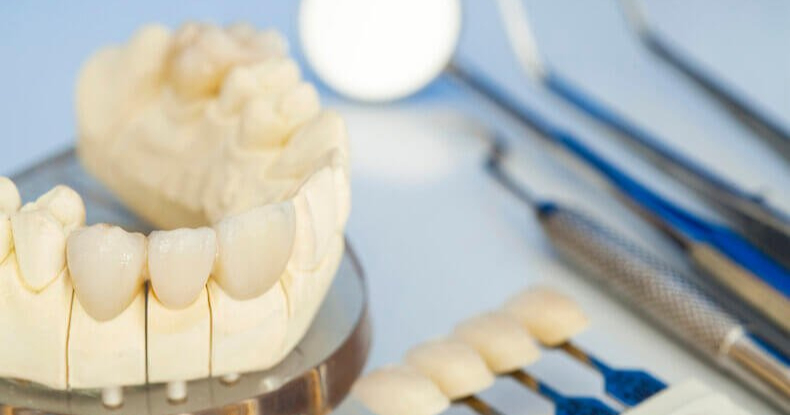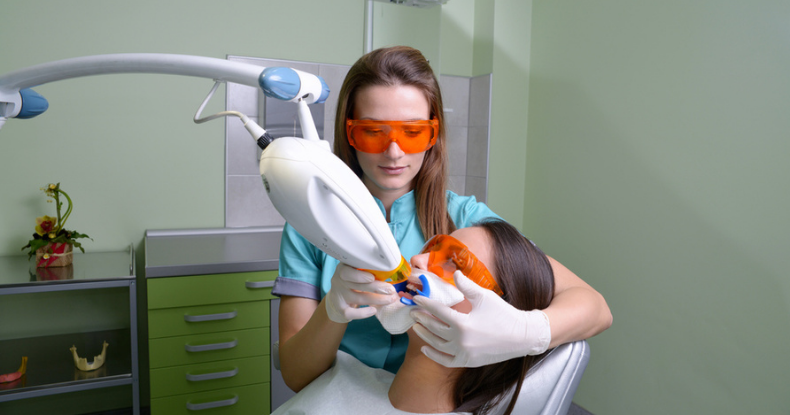Are you considering getting dental implants in Hungary? Dental implants are the most favourable treatment option for replacing missing teeth. A dental implant is a screw which is made of titanium to replace the root of a tooth. In dentistry, dental implants can be used to replace single teeth or multiple teeth.
When considering dental implants, Hungary is an excellent option given the cheap prices of dental treatment in comparison to the UK.
What is a dental implant?
Dental implants have three components: a titanium implant thread screwed into the jawbone, the abutment, which is a titanium extension post attached to the implant and the dental crown – a new and permanent prosthetic tooth which is colour matched to your natural teeth.
When a tooth has been lost or removed, a metal dental implant is placed into the jawbone as an artificial tooth root. Made of titanium, and compatible with human tissues, dental implants have become a common form of dental treatment in recent years.
Over time they also promote the regeneration of bone when implanted into the jaw which helps to create a firm and stable anchor for the prosthetic crown attached to the implant.
What are the advantages of teeth implants?
- Teeth implants blend perfectly with the colour of your natural teeth
- Many dental clinics in Hungary offer guarantees on their implants
- Unlike with dentures, speech and chewing function is unimpaired
- There is no risk of decay
- Compared with a dental bridge, implants are easy to clean, and therefore more hygienic
- Treatment is performed without disturbing the healthy teeth on either side
- Complete tooth loss in the lower jaw can promote bone loss; dental implants help prevent this degradation
- Dentures fitted to the upper jaw are uncomfortable and liable to slip, whereas implanted teeth are as stable as your natural teeth
- Dental implants do not cause nausea and do not interrupt the ability to taste
- Teeth implants appear the same as normal teeth with no evidence of attachments such as the hooks used in dentures
Is getting a dental implant painful?
There is a common misconception that implant placements can be painful. However, dental implants are less painful than extracting a tooth. Dental implant procedures in Hungary are performed under local anaesthesia. Furthermore, depending on bone quality, a single implant placement procedure can take as little as 20 minutes!
How long does a dental implant last?
It’s completely possible for a healthy and well-maintained implant to stay in your jawbone for a lifetime. However, there are many factors affecting the prognosis of a dental implant. For example; oral hygiene, jaw bone quality, systemic diseases, alcohol and smoking etc.
In addition to bone diseases, diabetes and some medicines may have a negative impact on implant prognosis. After investigating your medical & social history and after analysing your x-ray, your dentist in Hungary will decide if your jaw is compatible with the dental implant procedure. Different clinics give different periods of guarantee for their dental implant procedures.
How many dental implants can a dentist place in one session?
There is no strict rule for the maximum number of dental implant placements in one session. However, if there is a need for a large number of dental implant placements, dentists might choose to spread the procedure over two or more sessions for the sake of the patient’s comfort. Medical conditions can also affect the number of sessions.
If you require a full mouth of teeth implants you may want to consider looking into All-on-4 options in Hungary.
How long do teeth implants in Hungary take?
Depending on the type of implants you’re getting and any preparatory treatments you need (such as extractions, a bone graft or a sinus lift), you’ll need to make two or three visits for your implants. Each of these will probably require a stay of 3-5 days. Your dentist in Hungary will explain more about your treatment plan according to your individual needs.
For slightly quicker treatment you might opt for All-on-4 full mouth implants. These require fewer implant rods in the jaw than traditional types, which also makes them a cheaper option. They’re not right for everyone though, so research this treatment carefully before going ahead with All-on-4 dental implants in Hungary.
How do I care for my teeth implants?
First of all, maintaining oral hygiene after implant treatment is just as important as thorough treatment planning and competent surgery. As with natural teeth, if patients neglect oral hygiene after implant treatment, gum disease may occur around the implants.
Neglecting oral hygiene may even lead to loss of implants. For this reason, you should always ask your dentist in Hungary to give you concise information about implant aftercare.
Why get dental implants in Hungary?
Price of teeth implants in Hungary
The main reason to travel for dental treatment in Hungary is the price. Patients find that if they travel to Hungary, costs are lower, meaning a saving of up to 70% on UK dental prices. Of course, the more extensive and costly the treatment, the more you stand to save. That’s why Hungary teeth implants (including All-on-4) and veneers are particularly popular.
For visitors from the UK and Ireland, by taking advantage of low-cost fights you can still easily save a substantial amount by travelling to Hungary for the procedure, even taking into account flight and hotel costs.
On average, a dental implant treatment plan priced at £30,000.00 in the UK can be completed for as low as £9,000.00 in Hungary. It is easy to see how having your dental implants in Hungary can literally save you a small fortune.
In the table below are some approximate costs for dental treatment in Hungary versus the UK:
| UK £ | EUR € | US $ | CAN $ | AUS $ | |
| Dental Implant Prices – at home | 3,000 | 3,600 | 3,900 | 5,200 | 5,100 |
| Dental Implant Prices – Hungary | 900 | 1,080 | 1,158 | 1,563 | 1,535 |
Is the price of dental implants in Hungary standardised?
The simple answer is no, the price is not standardised. In Hungary, dental implant treatment is available in almost every dental clinic. However, each of these dental clinics in Hungary has different prices. The main factors influencing the cost of a dental implant in Hungary are:
1) Experience of the dentist
2) Brand of the dental implant
3) Reputation of the clinic
Are cheap dental implants in Hungary safe?
All dental implants, regardless of their brand, are produced from titanium. However, there is a big price difference between different brands. The more reputable and experienced dental implant manufacturers use different technology on implant surfaces that enhance the fusion between the dental implant and the jawbone. Hence, their prices are higher than others.
There are many dental clinics in Hungary that offer affordable dental implants. These implants originate from various countries, within Europe and further afield. The reason for the low cost of these brands is the competition between manufacturers. Mostly, these new brands produce high-quality dental implants from titanium and in order to be the most favoured by dentists in Hungary, they keep their prices as low as possible.
Quality of dentistry in Hungary
Hungary is now well established as a destination for overseas dental care. Hungarian dentists are well trained and experienced and they are required to be registered with the Ministry of Health which makes them accountable for their practices and work.
Many of Hungary’s dentists speak English fluently which allows for clear communication and easier understanding.
Standard of dental clinics in Hungary
The standard of dental clinics in Hungary is extremely high and comparable, if not better, to the standard of clinics in the UK. Hungary offers modern clinics which use state-of-the-art technology and high-grade materials.
Are there waiting lists for dentists in Hungary?
No, in general, you’ll find that waiting times are next to none. You should be able to schedule an appointment very quickly with your chosen dentist in Hungary – helpful if you need urgent dental care.
What are the standards and qualifications of dentists in Hungary?
Hungary’s oldest medical school, Semmelweis University, was founded in 1769 and has the country’s largest intake of dental students each year. Nestled in the heart of Budapest, it offers dental training in Hungarian, English and German. Almost half of its dental graduates each year are foreigners – a testament to the quality of its education. On completion of training, graduates are awarded a Doctor of Dental Medicine (D.M.D.) degree.
Dentists who wish to become qualified in a specialist field such as orthodontics, periodontology or prosthetic dentistry must first complete 36 months of work as an employee at a professional practice. They may then return to university to complete a postgraduate course.
How are Hungarian dentists regulated?
As a member of the EU, all dentists practising in Hungary must conform to EU standards. In addition, they must register with the Ministry of Health, which grants a certificate to those who can demonstrate a certain standard of operation. To keep this licence a dentist must stay educated on current standards by regularly attending seminars, lectures, etc.
Many Hungarian dentists are also registered with the Hungarian Medical Chamber (Magyar Orvosi Kamara – MOK). Although voluntary, this accreditation is a sign of prestige which is why so many dentists strive to achieve it by meeting rigorous criteria. It’s considered a privilege to be a member of the Hungarian Medical Chamber and this membership is something to look out for in your search for a dentist in Hungary.
Are dentist clinics in Hungary regulated?
Clinics in Hungary are not subject to continuous monitoring, but it’s assumed that a dentist who has reached a certain standard will care about how his or her clinic operates. You can select one which is ISO 9001 accredited if you want that extra peace of mind when having cosmetic dentistry in Hungary.
An overview of Hungary
Hungary is a land-locked European Union (EU) country that shares borders with Austria, Slovakia, Ukraine, Romania, Serbia, Croatia and Slovenia.
Located in Central Europe, the majority of International flights arrive at Budapest’s Liszt Ferenc International Airport and several other cities throughout the country. There are plenty of flight options, including budget airlines that offer cheap, frequent flights between most European countries, including Budapest. It’s also possible to travel to Hungary overland, by road and Eurorail through mainland Europe.
Since 1989, Hungary has been governed by a democratic parliament following the collapse of the Eastern Bloc. Today, Hungary is one of the world’s top 30 tourist destinations, and a well-developed high-income country.
Locations for dental care in Hungary
If you have decided to opt for Hungary as the country where you want to have your dental treatment, you’ll need to decide where in Hungary you’d like to stay. This choice may be determined by the type of treatment you need and where clinics are based that meet your needs. If you are seeking a standard treatment you’ll have a wide range of options.
Will you choose a dentist in the country’s capital city of Budapest or in a smaller city or town?
Budapest
The Danube River divides the two cities of Buda and Pest which collectively form Budapest, Hungary’s historic capital city. Budapest is one of the most picturesque cities in Europe and it’s a popular city for travellers. Holidays to Budapest can come in at around half the cost of holidays in some other Western European cities.
Hungary is well known for its healing thermal waters and Budapest offers several world-famous thermal spas. If you are staying in Budapest, and have the available time, it is a good idea to allow for a couple of extra days to enjoy the spas and explore the city. Some clinics provide their own tours and tourism programs which you can fit in around visiting your dentist.
Accommodation in Budapest is varied, from basic rooms to luxury 5-star city hotels. There are accommodation options to suit every taste and budget. Hotel prices are extremely affordable with 3-star hotel rooms starting from around £20 per night.
Dental clinics in Budapest
A lot of the best dental clinics in Hungary are found in Budapest. Dentists in Budapest are well known for their high standards of cosmetic dentistry as well as routine dental care. Some Budapest dental clinics provide airport pickups, their own accommodation and tourism packages.
Other locations
Other cities in Hungary worthy of a visit include Pécs in the south, Szeged in the southwest, Eger, the wine capital of the north, and Mosonmagyaróvár which lies close to both the Austrian and Slovakian borders.
Clinics in locations away from the capital will take a little longer to reach but you may well find that prices are lower in more remote areas. The rural areas outside of the cities offer a simpler life, a slower pace and a glimpse into how things used to be. There are also endless opportunities for outdoor pursuits – from bird-watching to cycling and horseback riding.
Considerations & how to book a dentist in Hungary
The best Hungarian dental centre for you will depend on the work you need to have done and what kind of holiday, if any, you want to have while you are there. If you are seeking a specialist treatment or procedure, then you should look for a specialist dentist in that specific field.
If you require multiple treatments that require multiple specialists you may want to consider getting treatment from one of the larger dental clinics that employ several dentists in different fields.
Below is a list of additional considerations to take into account before having dental treatment in Hungary:
- Is the dentist you have chosen registered with the Ministry of Health? This is mandatory for all dentists practising in Hungary.
- Membership in the Hungarian Medical Chamber (Magyar Orvosi Kamara – MOK) is a plus point if you are considering dental treatment in Hungary.
- How experienced is your dentist in the procedure you need? Are there online reviews available?
- Is English going to be an issue? Ask to speak directly with the dentist prior to booking so you have a solid idea of their language ability.
- Is the dental work guaranteed?
- Does the clinic provide extra services such as airport transfers, accommodation or tourism options as part of your package?
Never feel uncomfortable about asking questions, you want to be sure that you are booking the right dentist for your needs and you need to be comfortable in your decision!
FAQs
Are there waiting lists for dentists in Hungary?
No, in general, you’ll find that waiting times are next to none.
Are dentist clinics in Hungary regulated?
Clinics in Hungary are not subject to continuous monitoring, but it’s assumed that a dentist who has reached a certain standard will care about how his or her clinic operates. You can select one which is ISO 9001 accredited if you want that extra peace of mind when having cosmetic dentistry in Hungary.







